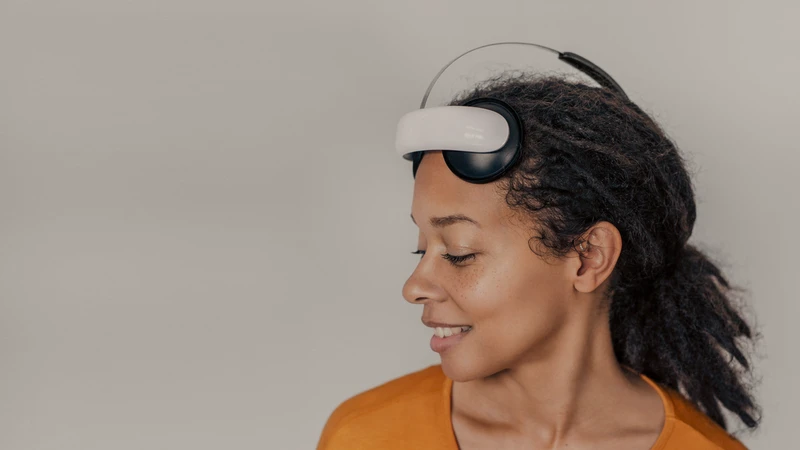
Feel alive again
- Clinically proven depression treatment
- Used by the NHS
- Backed by multiple, independent clinical trials
Used by the NHS
to treat depression
You can access a Flow trial if you live in West London, Northamptonshire or Leicestershire and you meet the qualifying criteria, or if you are an NHS clinician suffering from depression.
Every NHS service using the headset has independently published their findings, demonstrating that Flow is safe and effective to use. A Crisis Service reported up to a 75% drop in feelings about self harm and suicide when patients were using the headset.
“I’ve seen people who haven’t responded to anything else, no longer struggle with depression.”
Mark McConnochie, NHS Consultant Psychiatrist

How it works
A non-invasive headset
Research shows that depression is linked to reduced activity in key areas of the brain that regulate mood and emotion. Flow works with your brain's natural electrical signals to gently stimulate these regions, helping to relieve depression symptoms.
While traditional treatments focused on chemical imbalances, modern neuroscience has revealed that depression is more complex. Recent research shows that directly targeting brain activity can be an effective approach to managing depression symptoms.
Flow in action
Flow is also available in the EU, Norway, Hong Kong and Brazil.
Evidence
Flow uses a technology called tDCS (or transcranial Direct Current Stimulation). This has been used in clinics for over 25 years, and has been proven to be safe and effective across multiple independent trials.
See more results20+ clinical trials
Multiple large, independent clinical trials into tDCS demonstrate it is safe and effective
77% report improvement
In our real world database of over 14,000 users
57% depression-free
In the largest clinical trial into tDCS in the UK and US
Real world data, an improvement of 3pts or more on the clinically validated MADRS-S survey after 3 weeks, n=14,383.
Woodham, R.D., Selvaraj, S., Lajmi, N. et al. Nat Med (2024).
Rebalance your brain
Feel better in 3 weeks

Medication-free, no serious side effects
Flow is non-invasive brain stimulation. There are no serious side effects associated with tDCS.
Safety and side effects
Feel better in 3 weeks
Most Flow users see improvement within 3 weeks and continue to use the headset for a minimum of 6 months.
Evidence
30-day money-back guarantee
Whether you buy or rent, anyone can return their headset within 30 days, no questions asked.
Returns and refundsSupported by
NHS doctors and leading academics

"Flow has been an amazing tool to safely and effectively help patients with depression to recover faster. The feedback from our patients and staff has been overwhelmingly positive."
Dr Mark McConnochie
NHS Consultant Psychiatrist

"Flow has gained popularity among our patients. This positive reception speaks volumes about the effectiveness and patient satisfaction associated with Flow."
Dr Azhar Zaraf
NHS GP

"The use of neuromodulation techniques such as tDCS and TMS provide an alternative and effective treatment for that group of patients who are very difficult to manage with medication."
Prof Alex O'Neill-Kerr
NHS Psychiatrist

"We are pleased to be able to offer tDCS as part of a range of therapies as reviewed by NICE for the treatment of depression, especially as sometimes mothers prefer not to take medication if they are breastfeeding."
Dr Carol Abraham
NHS Perinatal Doctor

"With Flow's brain stimulation headset our highly respected experts now have a new tool to treat depression."
Elena Touroni
PhD, Clinical Director, Chelsea Psychology Clinic

"Flow's exciting and encouraging data raise the prospect of a real advance in the treatment of depression... A helpful intervention for many people suffering from major depression."
Prof Allan Young
Chair of Mood Disorders, King's College London

"Flow's results show a clear separation of active and sham treatment in a large, multisite randomised controlled trial... A very promising development in mental health treatment."
Dr Corey Keller
Assistant Professor of Psychiatry and Behavioural Sciences, Stanford University
Join our growing community of more than 50,000 members
When you buy a Flow headset you join our community and we're here to support you at every step. Tapas and Joey are on hand and ready to help with any questions you may have.
Is Flow for me?
Combine with antidepressants
Flow doesn’t interfere with medicines you may be taking and is generally safe to use if you have other medical conditions or if you suffer with other mental health conditions.
Flow can be used in adults who have a diagnosis of mild to severe depression. Always talk to a doctor before you make any changes to your treatment, or if you are pregnant, have a skull problem or metal in your brain, cochlear implants or brain pacemaker, epilepsy/seizures, a device implanted in your body or a skin condition affecting your forehead.
Take the quiz
Try Flow, with a
30-day money-back guarantee
Feel confident that Flow is the right choice for you. You can return it for any reason within 30 days and receive a full refund. It doesn’t matter if you’ve purchased, rented, or used the headset. We’ve made our returns process as simple as possible.

Submit your refund request within 30 days of the shipment date here.

Receive a prepaid return shipping label via email. Print it or use the Royal Mail 'Bring my label' service if arranging a collection.

Drop off the parcel at any Royal Mail location or schedule a collection.
Start today
Getting set up is quick and easy

Order the Flow Headset
Buy or rent your Flow Headset on our website and get it delivered to your door in 1-3 working days.

Download the app
Download the Flow Neuroscience App for free, connect your headset to your phone via bluetooth and start stimulating.

Track your symptoms
Monitor your mood, sleep, focus, appetite, concentration levels and more, to understand what impacts your depression and see your symptom improvements.














